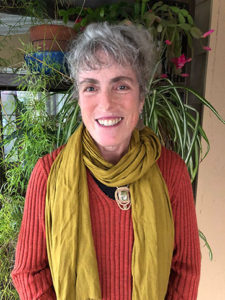Mary Carman Barbosa
Mary was born in San Francisco and has pleasant memories of her early childhood in the Sierra foothills in Placerville—where her father held his first position out of law school—of playing with her three siblings, climbing oak trees, and attending a two-room schoolhouse where her first-grade teacher was named, prophetically, Mrs. Brazill. Her family settled in Corte Madera when she was nine.
An early love of learning Spanish led to a summer of studying in Guadalajara and another administering vaccinations in Ecuador during high school, and ultimately to a focus on Latin American studies at UC Santa Cruz. This passion dramatically changed the course of her life.
The year was 1978, and Mary found herself on an airplane headed for São Paulo, Brazil, where she would spend her junior year as an exchange student, meanwhile, she said, undoing my years of progress in Spanish while adopting Portuguese. There she met the man who would become her husband of thirty years and the father of her two sons.
After graduating and spending an unenamored period working for Brazilian and Portuguese banks—first in Washington, DC, then in San Francisco—Mary earned a Certificate in Publishing through UC Berkeley’s extension program. She quickly landed a job with Jossey-Bass Publishers in San Francisco, where she worked for five years, the final four as production manager of the journals department. She turned to freelancing after the birth of her first child, and in 1999, now with two children in tow, ages two and nine, her family relocated to the outskirts of Natal in the northeast of Brazil, beginning two decades of dividing her time between Brazil and Marin that still continues.
Another time Mary decided to take the road less traveled was when she became dissatisfied with the education her youngest son was receiving in Brazil. Knowing that Kaio would be exposed to more creative schooling at an intentional community she hopped on a plane with him to Auroville, in the Pondicherry region of India, and lived in a hut in this community for four-plus months in 2010 while he attended a semester of middle school among international classmates and she continued her freelancing; they returned the next year for a repeat performance. I felt that I had been in ‘training’ for India for years by living in tropical Brazil, she told me. My husband José needed to remain in Brazil to tend to his cashew-roasting business, but he joined us later that first year, and the three of us traveled widely in the north of India. Living in Auroville was a growing experience for all of us, she reminisced.
Mary’s career as a freelance copy editor has been ideally suited to her peripatetic
lifestyle since it enables her to work from anywhere. Her main employer over the years has been Stanford University Press, for whom she edits books related to Latin America. When I’m working on a book, I become single-minded and deeply focused, she told me.
I barely leave the house for days at a time.
When Mary returned to the States after twelve years abroad, in 2012, she and Kaio joined forces with her father, Lynn, in San Rafael for three years, until Lynn bought a home on Marin Valley Drive where Mary has continued living since he died at age 90 in 2017.
Mary said she will be leaving for the warm breezes once again in late January and is excited about her family’s plan to reunite, for the first time in a decade,
in Brazil.
When I asked Mary about her current passions, she answered without hesitation: the environment. I am a hyperrecycler, she said. I don’t buy anything new if I can help it, and I save, reuse, and recycle everything. Recently I took two years’ worth of bottle caps to Subaru for their recycling program. I throw very little away. A vegetarian for 15 years, Mary is also one of Marin Valley’s “ambassadors” for the Rollin’ Root farmers market that delivers produce to the Park every Thursday.
I was very impressed with her dedication to recycling and requested a brief tour of her kitchen, where I saw storage for cartons and plastic bags and for food waste headed for the green bin. The small paper garbage bag was practically empty.
The ideal is to have no garbage at all, she said, which will only truly have an impact if the whole world joins in. It was clear to me that she walks her talk. ■
